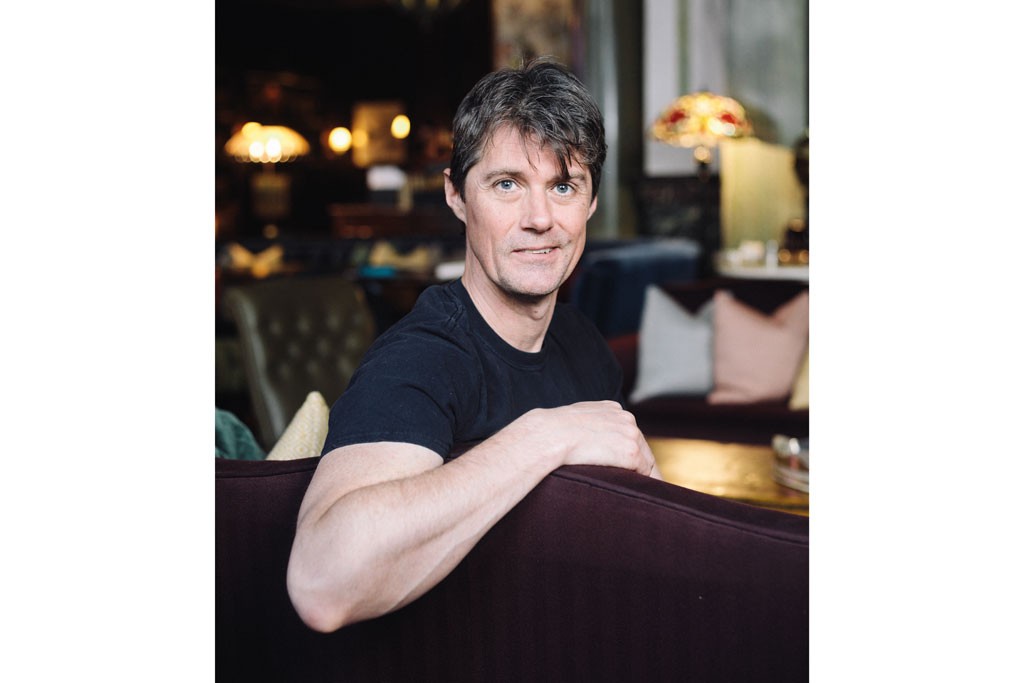Conversations at Scarfes Bar: Mark Stevenson
The futurist on sustainable solutions to our global problems
This post may contain affiliate links. Learn more
Mark Stevenson: the pragmatic optimist. By Charlotte Metcalf
Mark Stevenson doesn’t do small talk. His conversation is on a big, bold scale, from saving the planet to his love and admiration for his wife, Caroline, whom he describes as ‘a beautiful, kind soul with no bullshit’.
Mark’s first book, An Optimist’s Tour of the Future, proved he is a writer capable of communicating complex scientific ideas, but the more recent We Do Things Differently cemented his reputation as a voice that needs heeding – advising organisations as diverse as Médecins Sans Frontières and Weatherbys Bank (‘the bank you go to if you think Coutts is a bit too chavvy for you,’ he quips).
Mark grew up in a Staffordshire village. He wanted to be a musician but his father, a sensible accounts clerk, persuaded him to study computing and business at Salford, where Mark admits he ‘gamed the system’, achieving a first-class degree while playing in the vibrant ‘Madchester’ scene. Moving to London, he became: ‘a brain for hire to fund the guitars’. ‘My life was mad,’ he recalls. ‘I’d be in the European Central Bank in Frankfurt talking to heads of security about cryptography and then I’d get on a plane, pick up my guitar and play a gig at the Water Rats Theatre.’
In 2004, while his band Clear was recording their second album, they split. Mark was also fired (by mutual consent) from his ‘soulless corporate job’. He felt lost: ‘I’d spent most of my money on music and was renting a bedsit in a grimy garret. At the same time my “normal” friends were complaining they’d built prisons for themselves with their mortgages and kids and I realised I was totally free. I could do whatever I wanted and decided it was to wage a war against denialism and cynicism. Across the board I saw a lack of engagement with the systemic and brutal problems we face and very little optimism and knowledge as to solving them.’
The natural next step was – obviously – to become a stand-up comedian. Yes, a stand-up comedian. ‘There was lots of knowledge out there but it was only being shared among us geeks,’ says Mark. ‘Comedy nails the truth and people work better when having fun. So I thought I’d take all the major issues, like gender inequality, the erosion of democracy or climate change, and turn them into routines. We laugh most at the truest things and once people have laughed at something, they can’t deny its veracity.’
Irons Man: Interview with Max Irons for C&TH’s February Issue
After establishing a flourishing and viable career in comedy, Mark met a neighbour – a literary agent – at a local party. With his encouragement, Mark turned to longer-form writing: ‘I loved Michael Palin and Bill Bryson and thought I could use their models to communicate geeky ideas to a non-geeky audience’.
Two books later, Mark’s writing voice is louder but music and comedy still play a role. His current band, Quantum Pig, was nominated for a Prog Limelight Award in 2019 and they’re working on a second album, to be released later this year. Mark’s also rewriting Octopus Soup, the play he wrote with his friend Jack Milner, which will tour for second time in 2021. Oh – and he’s a father to two sons under four.
How does he manage to be such a productive polymath? (I ask him this on the day Britain’s great cultural polymath, Jonathan Miller, dies.) ‘Get out of your comfort zone and be curious,’ responds Mark, ‘because you can’t be creative in a silo. It’s why Silicon Valley turns out to be so boring. True innovation comes from people living at the margins and in the most broken places.’ We Do Things Differently charts Mark’s journey to visit all those ‘outsiders rebooting the world’, whether they’re an urban farmer in Detroit, a neighbourhood activist in Brazil or an ex-nightclub owner turned inspirational headmaster in Lincolnshire.
Mark and his wife also made a pact to involve each other in activities they wouldn’t choose alone. So Caroline ‘dragged’ Mark to see a contemporary dance version of Dracula, which made him view his own physicality differently. He embarked on a fitness regime that he’s determined will have him in better shape at 50 than he was at 25.
This leads us on to chatting about his positive, can-do attitude and so I’m surprised when he says he considers himself ‘possibilistic’ rather than optimistic. ‘It’s like The Good, The Bad and The Ugly,’ Mark explains. ‘There are good, sustainable solutions but if we preserve the status quo and don’t use them it’ll be bad – end-of-civilization bad. The good is here and the bad is there and I see my job as transitioning good from here to there in a workable way. The ugly part is the bloodbath that will happen during the transition phase needed to save our world. I feel I’ve been in training 20 years for this moment.’
Mark’s greatest strength is harnessing every skill he possesses, including cracking jokes, to communicate those notoriously inconvenient truths in a fresh, accessible way that, he hopes (just about optimistically), might make us all sit up, listen and act before it’s too late.
MORE SCARFES BAR:
Nicholas Coleridge / Jay Rayner / Caroline Coon / Dr Tim Spector


